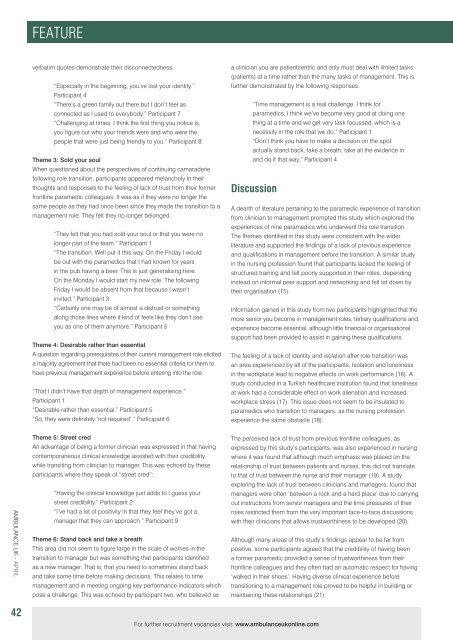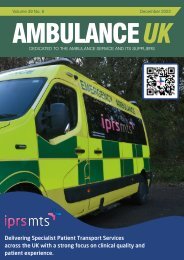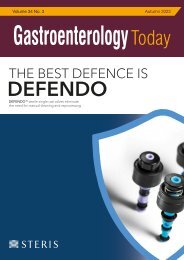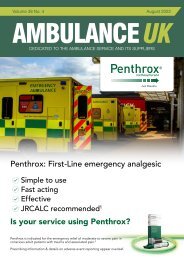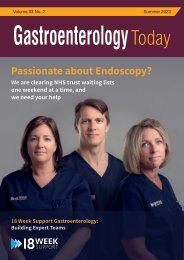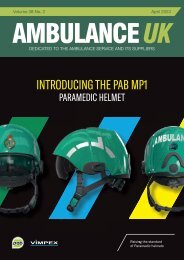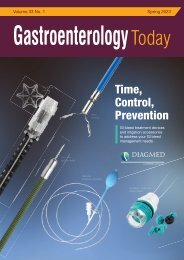Ambulance UK April 2021
Ambulance UK April 2021
Ambulance UK April 2021
Create successful ePaper yourself
Turn your PDF publications into a flip-book with our unique Google optimized e-Paper software.
FEATURE<br />
verbatim quotes demonstrate their disconnectedness.<br />
“Especially in the beginning, you’ve lost your identity.’’<br />
Participant 4<br />
“There’s a green family out there but I don’t feel as<br />
connected as I used to everybody.” Participant 7<br />
“Challenging at times. I think the first thing you notice is,<br />
you figure out who your friends were and who were the<br />
people that were just being friendly to you.” Participant 8<br />
Theme 3: Sold your soul<br />
When questioned about the perspectives of continuing camaraderie<br />
following role transition, participants appeared melancholy in their<br />
thoughts and responses to the feeling of lack of trust from their former<br />
frontline paramedic colleagues. It was as if they were no longer the<br />
same people as they had once been since they made the transition to a<br />
management role. They felt they no longer belonged.<br />
“They felt that you had sold your soul or that you were no<br />
longer part of the team.” Participant 1<br />
“The transition. Well put it this way. On the Friday I would<br />
be out with the paramedics that I had known for years<br />
in the pub having a beer. This is just generalising here.<br />
On the Monday I would start my new role. The following<br />
Friday I would be absent from that because I wasn’t<br />
invited.” Participant 3<br />
“Certainly one may be of almost a distrust or something<br />
along those lines where it kind of feels like they don’t see<br />
you as one of them anymore.” Participant 5<br />
Theme 4: Desirable rather than essential<br />
A question regarding prerequisites of their current management role elicited<br />
a majority agreement that there had been no essential criteria for them to<br />
have previous management experience before entering into the role.<br />
“That I didn’t have that depth of management experience.”<br />
Participant 1<br />
“Desirable rather than essential.” Participant 5<br />
“So, they were definitely ‘not required’.” Participant 6<br />
a clinician you are patientcentric and only must deal with limited tasks<br />
(patients) at a time rather than the many tasks of management. This is<br />
further demonstrated by the following responses:<br />
“Time management is a real challenge. I think for<br />
paramedics, I think we’ve become very good at doing one<br />
thing at a time and we get very task focussed, which is a<br />
necessity in the role that we do.” Participant 1<br />
“Don’t think you have to make a decision on the spot<br />
actually stand back, take a breath, take all the evidence in<br />
and do it that way.” Participant 4<br />
Discussion<br />
A dearth of literature pertaining to the paramedic experience of transition<br />
from clinician to management prompted this study which explored the<br />
experiences of nine paramedics who underwent this role transition.<br />
The themes identified in this study were consistent with the wider<br />
literature and supported the findings of a lack of previous experience<br />
and qualifications in management before the transition. A similar study<br />
in the nursing profession found that participants lacked the feeling of<br />
structured training and felt poorly supported in their roles, depending<br />
instead on informal peer support and networking and felt let down by<br />
their organisation (15).<br />
Information gained in this study from two participants highlighted that the<br />
more senior you become in management roles, tertiary qualifications and<br />
experience become essential, although little financial or organisational<br />
support had been provided to assist in gaining these qualifications.<br />
The feeling of a lack of identity and isolation after role transition was<br />
an area experienced by all of the participants. Isolation and loneliness<br />
in the workplace lead to negative effects on work performance (16). A<br />
study conducted in a Turkish healthcare institution found that loneliness<br />
at work had a considerable effect on work alienation and increased<br />
workplace stress (17). This issue does not seem to be insulated to<br />
paramedics who transition to managers, as the nursing profession<br />
experience the same obstacle (18).<br />
AMBULANCE <strong>UK</strong> - APRIL<br />
Theme 5: Street cred<br />
An advantage of being a former clinician was expressed in that having<br />
contemporaneous clinical knowledge assisted with their credibility<br />
while transiting from clinician to manager. This was echoed by these<br />
participants where they speak of “street cred”:<br />
“Having the clinical knowledge just adds to I guess your<br />
street credibility.” Participant 2<br />
“I’ve had a lot of positivity in that they feel they’ve got a<br />
manager that they can approach.” Participant 9<br />
Theme 6: Stand back and take a breath<br />
This area did not seem to figure large in the scale of worries in the<br />
transition to manager but was something that participants identified<br />
as a new manager. That is, that you need to sometimes stand back<br />
and take some time before making decisions. This relates to time<br />
management and in meeting ongoing key performance indicators which<br />
pose a challenge. This was echoed by participant two, who believed as<br />
The perceived lack of trust from previous frontline colleagues, as<br />
expressed by this study’s participants, was also experienced in nursing<br />
where it was found that although much emphasis was placed on the<br />
relationship of trust between patients and nurses, this did not translate<br />
to that of trust between the nurse and their manager (19). A study<br />
exploring the lack of trust between clinicians and managers, found that<br />
managers were often ‘between a rock and a hard place’ due to carrying<br />
out instructions from senior managers and the time pressures of their<br />
roles restricted them from the very important face-to-face discussions<br />
with their clinicians that allows trustworthiness to be developed (20).<br />
Although many areas of this study’s findings appear to be far from<br />
positive, some participants agreed that the credibility of having been<br />
a former paramedic provided a sense of trustworthiness from their<br />
frontline colleagues and they often had an automatic respect for having<br />
‘walked in their shoes’. Having diverse clinical experience before<br />
transitioning to a management role proved to be helpful in building or<br />
maintaining these relationships (21).<br />
42<br />
For further recruitment vacancies visit: www.ambulanceukonline.com


